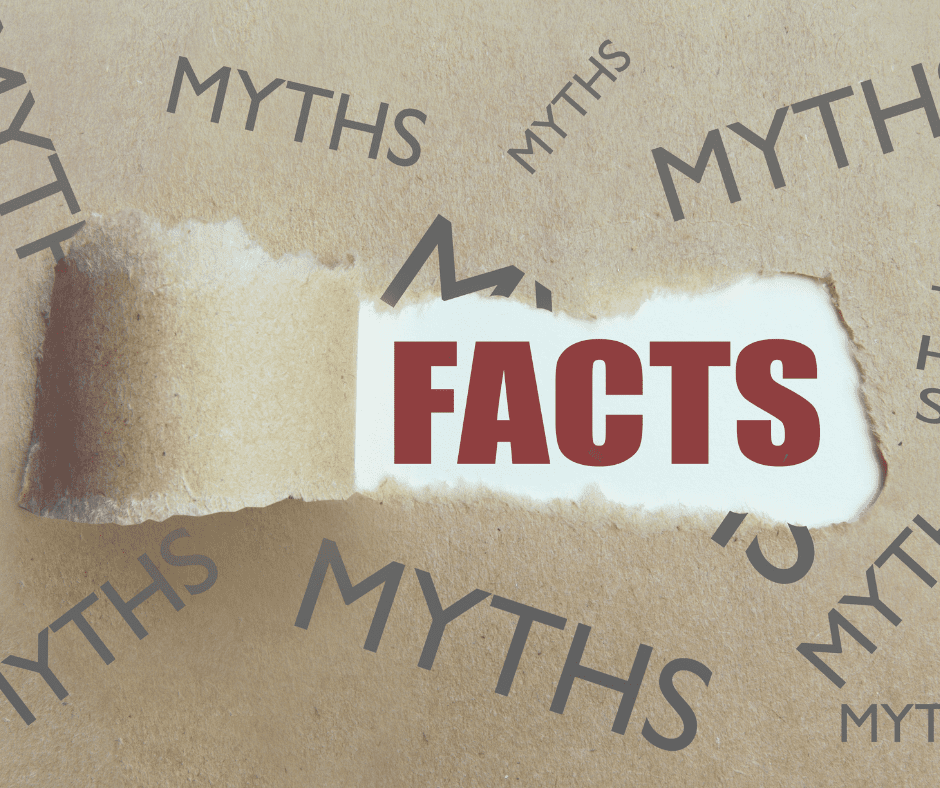Are you trying to lose weight but are not getting anywhere? There are all kinds of “do this” and “don’t do that” advice all around us. In fact, so much is said about losing weight that it can be hard to sort fact from fiction.
I am here to clear up some the top 8 weight loss myths you may have heard.
- You just need to balance your calories in versus your calories out. This is false because decreased caloric intake and increased energy expenditure does not lead to long-term weight loss. Rather, it is the type of calorie you take in (such as calories from carbohydrate vs. calories from fat or protein) that impacts weight loss. The type of calories you ingest impact your hormonal balance (specifically insulin) and foods that increase insulin production can contribute to weight gain. For example, 200 calories from white bread is different from 200 calories from whole grain bread with peanut butter. And keep in mind, many things other than calories also contribute to weight gain such as: stress, lack of sleep, processed foods, certain medications, among others.
- It’s better to lose weight slowly. When it comes to weight loss, you tend to hear that slow and steady weight loss is better, especially for long-term success. However, this isn’t necessarily true. In fact, studies have compared a 12-week rapid weight loss program to a 36-week gradual plan. After the dieters lost weight, they were put on the same maintenance plan and both groups did the same in terms of regaining their weight. Generally speaking, there is no advantage to losing weight slowly over quickly – both are equally effective.
- There are no medications to treat being overweight. This is also false. Although there is no magic pill to melt the fat away, there are several FDA approved medications available. When used in conjunction with a specific dietary plan along with lifestyle modifications, they can significantly help in weight loss. Remember, having to take weight loss medication is not a sign of weakness, rather, it is a treatment of a disease, just like diabetes or high blood pressure.
- People who can’t lose weight have no “will power”. False. Did you know that your body is made to protect your individual weight “set point” even if it is above your healthy weight? This is an ancient physiologic process that helped our ancestors survive starvation. This means that when you lose weight, your body starts to decrease your metabolism and increase your hunger. Your body sees weight loss as a cue that there may be a famine coming. What your body doesn’t know is that in the modern world, food is readily available. There are ways to fight this process. We have great science backed tips and solutions to fight this process.
- In order to lose weight, you just have to increase your exercise. Exercising is necessary for good health. But for weight loss, about 80% of the equation is dietary. Exercise alone generally doesn’t lead to weight loss although it does play a significant role in maintaining the weight you have lost.
- Eating fat makes you fat. One of the biggest myths in nutrition is that eating fat makes you fat. In fact, eating more good fats (along with quality protein) leads to weight loss and eating more carbohydrates leads to weight gain. Of additional importance, fats and proteins keep you full while carbohydrates cause more hunger and cravings.
- All carbs are bad. Just like fats, not all carbohydrates are created equal. You should avoid foods that are processed and high in sugar. Rather, enjoy the good carbohydrates which are high in fiber like beans, legumes, whole grains and vegetables.
- Your weight loss goal should be a normal BMI (body mass index). False again. Your BMI is just your height/weight ration. It does not take into account your muscle mass. A more accurate way to assess weight loss is to measure fat mass. For women, a healthy fat mass percentage goal is somewhere in the 30s and for men, in the 20s. You want to preserve as much muscle mass as possible as you lose weight and only burn fat. And remember, it only takes a 5-10% weight loss to see improvements in acid reflux disease, diabetes, and even hypertension.
So, as you continue to come across all kinds of quick weight loss methods, be sure to watch out for the fads and gimmicks that can do more harm than good. Remember to look for weight loss methods that are backed by science.
I am an experienced board-certified weight loss physician, and I would love to help you feel your best through safe and effective weight loss. Whether you have 5 pounds or over a 100 pounds to lose, we have a program that can work for you…and we are with you every step of the way!





